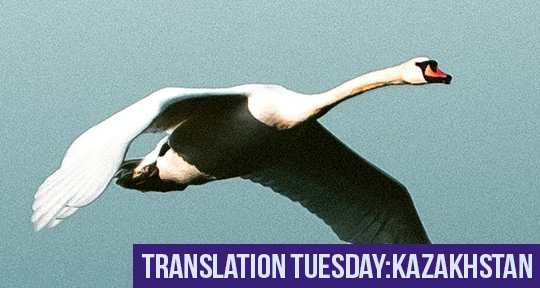The influential musings of Kazakh intellectual Akhmet Baitursynuly are sympathetically brought to light by translator Jake Zawlacki this Translation Tuesday. A letter to his people in the form of poignant free verse, Kazakh Culture reflects Baitursynuly’s deep care for Kazakh autonomy and the nationalist ideology that spurred his resounding contributions to Kazakh communities across the globe.
A goose might freeze flying, honking,
Landing in a dry lake, cooling.
A grassfire might break out,
Our bodies burned—what remains?
Alash’s people all known:
Who was not measured?
“I’m well,” they all say,
Wellness confined to themselves.
Chattering, feigning skilled speech,
Rushing, pushing, galloping.
Unbelted, a slack child coming
Like half-pressed felt, unfinished.
Hunched, old hunters seeking meat,
Searching, just one more honorable feast.
Sincere, they’re here and there
Counting few to many, simple but generous.
Unhelping, many rich misers
Like boats on rocking waves.
So many lie silent, sleeping,
Moving without purpose or ambition.
We line up with them, orderly,
Satisfied with sparkling buttons.
What use do you get from your talent,
If not struck in the right places?
These words, this letter I write with sorrow,
No value left, the lost Kazakh.
Rich worry wealth, educated worry rank,
Little worry left for the people.
*Alash encompasses the three historical tribal and territorial divisions of Kazakhs. It was also used in 1917 as the name of the provisional government Alash Orda, of which Baitursynuly was a member. The term is often used synonymously with “Kazakh.”
Translated from the Kazakh by Jake Zawlacki.
Akhmet Baitursynuly (1872-1937) was a Kazakh nationalist at the turn of the century and was highly influential to Kazakh culture both creatively and politically. He was not only one of the members of the Kazakh nationalist group Alash Orda, a provisional government seeking autonomy for the Kazakh people following the Bolshevik revolution (1917), but he also adapted the Arabic script to be used with the Kazakh language, adding new characters for Kazakh letters to a script still used today in parts of China, Afghanistan, and Iran. After being sent to a gulag and executed in 1937, his work in politics, education, poetry, and linguistics were mostly forgotten. However, near the end of the Soviet Union, his memory was rehabilitated and he is now appreciated as one of the intellectual forefathers of modern Kazakhstan. In 1911, he published his most well-known collection of poems titled Masa, or “Mosquito.” In it, he rallies for the Kazakh people to embrace education and create a future of their own choosing, not one handed to them by Russian imperialists. The selected translations offer a glimpse into Baitursynuly’s range in subject and form, and into the mind of a man desperately pushing for a better Kazakh future.
Jake Zawlacki is currently a third-year MFA candidate at Louisiana State University and holds a Master’s degree in Russian, Eastern European and Eurasian Studies from Stanford University. He has been the recipient of a Fulbright Fellowship to the Kyrgyz Republic where he conducted research on the demographics of traditional cradle board usage and has written scholarly works on Kazakh animation and folklore, and how they relate to Kazakh national identity construction. His creative work often explores meaning and free will through experimental and hybrid forms and can be found at The Saturday Evening Post, Two Hawks Quarterly, and The Citron Review.
***
Read more from Translation Tuesdays on the Asymptote blog:

